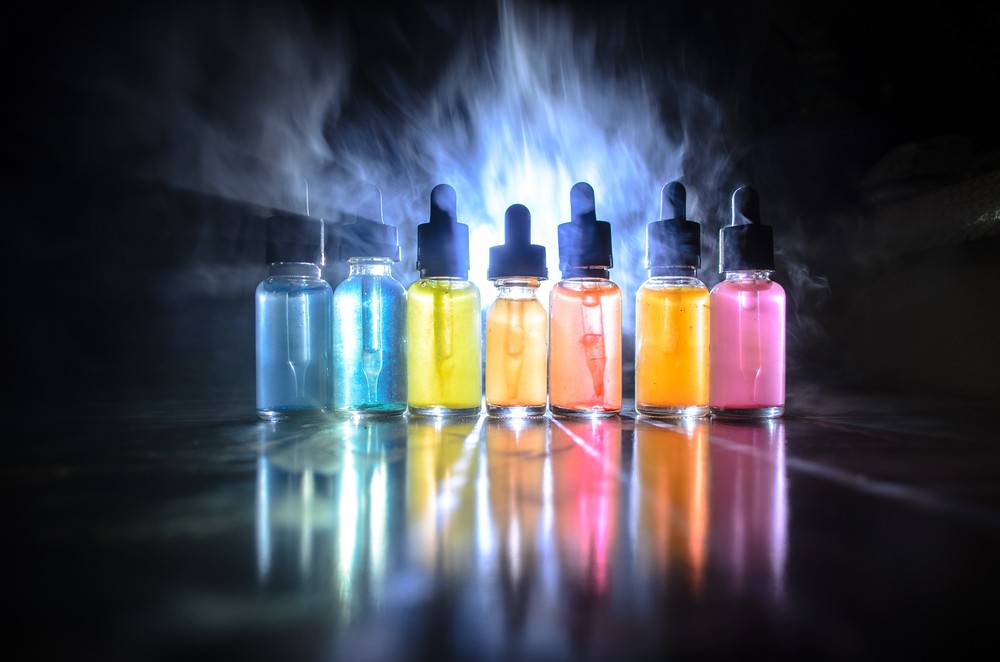Popular Reads
Top Results
Can't find what you're looking for?
View all search resultsPopular Reads
Top Results
Can't find what you're looking for?
View all search resultsMint, menthol e-cigarette liquids high in cancer-causing compound: Study
Change text size
Gift Premium Articles
to Anyone
 The levels of pulegone, a carginogenic constituent of mint plant oil, that are inhaled by e-cigarette users are as much as 1,000 times higher than those taken in by smokers of menthol cigarettes, Duke University School of Medicine researchers said. The study involved six types of pulegone-containing smokeless tobaccos and e-cigarette liquids used for vaping. (Shutterstock/File)
The levels of pulegone, a carginogenic constituent of mint plant oil, that are inhaled by e-cigarette users are as much as 1,000 times higher than those taken in by smokers of menthol cigarettes, Duke University School of Medicine researchers said. The study involved six types of pulegone-containing smokeless tobaccos and e-cigarette liquids used for vaping. (Shutterstock/File)
A
cancer-causing compound banned by U.S. regulators last year as a food additive has been found at potentially dangerous levels in mint and menthol flavored e-cigarette liquids and smokeless tobacco products, researchers said on Monday.
The findings, published in the journal JAMA Internal Medicine, provided the latest evidence about health concerns related to e-cigarettes. Federal health officials are investigating lung illnesses linked to e-cigarettes and vaping products tied to six U.S. deaths.
The levels of pulegone, a carginogenic constituent of mint plant oil, that are inhaled by e-cigarette users are as much as 1,000 times higher than those taken in by smokers of menthol cigarettes, Duke University School of Medicine researchers said. The study involved six types of pulegone-containing smokeless tobaccos and e-cigarette liquids used for vaping.
The Food and Drug Administration barred the use of pulegone as a food additive after receiving petitions from health and environmental groups.
"The FDA regulatory regimen for food is much more strict than what is required for e-cigarettes," said study co-author Sven-Eric Jordt of the University Program in Environmental Health at the Duke University School of Medicine. "In the '70s, the tobacco industry already knew that pulegone was undesirable and moved to synthetic flavorings."
To calculate acceptable levels of carcinogens in food, the FDA takes the highest amount animals can consume without developing tumors and divides it by the estimated amount consumed per day. The resulting number - called the "margin of exposure," or MOE - needs to be above 10,000 for the food to be deemed safe by regulators. Lower MOEs are a cause for concern. And the lower the number, the less safe the food.
"The FDA decided that the intake of a carcinogen from food must be at least 10,000-fold less than the maximal dose that doesn't cause cancer in an animal," Jordt said. "Meaning, the product is 10,000-fold safer."
Of the six types of pulegone-containing smokeless tobaccos and e-cigarette liquids examined, all came out with MOEs below 10,000, the researchers said.
Depending on consumption rates, MOEs for the e-liquids ranged between 325 and 6,012, and for a pulegone-containing smokeless tobacco they ranged between 549 and 1,646.
The researchers determined that the MOE for one e-cigarette liquid, V2 Menthol, ranged from 3,084 to 325, depending on how much was consumed. For that example, daily exposure to pulegone was 86 to 1,608 times higher with e-cigarette use than with a menthol combustible cigarette.
Read also: New York to ban flavored e-cigarettes after illnesses, deaths
Dr. Panagis Galiatsatos, director of the Tobacco Treatment Clinic at the Johns Hopkins Medical School, called the findings "highly concerning."
This is yet another example of something that has been looked at by the FDA only as a food and not as an inhalant, Galiatsatos said. Galiatsatos, who was not involved in the research, added that the study "tells us how willing e-cigarette makers are to create an enhanced experience at the cost of health ramifications."
The researchers noted that the tobacco industry has minimized pulegone levels in cigarette flavorings because of toxicity concerns.
"Our findings appear to establish health risks associated with pulegone intake and concerns that the FDA should address before suggesting mint- and menthol-flavored e-cigarettes and smokeless tobacco products as alternatives for people who use combustible tobacco products," the researchers wrote.
President Donald Trump's administration last week announced plans to remove all flavored e-cigarettes from store shelves in a widening crackdown on vaping, as officials warned that sweet flavors have drawn millions of children into nicotine addiction.










